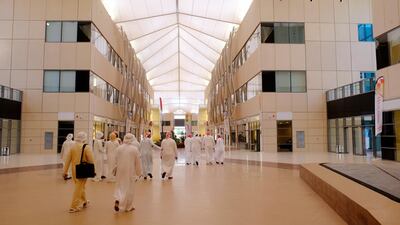Zayed University in Abu Dhabi plans to completely transform the way it teaches students over the next five years by offering programmes that prepare them better for the workforce.
In August, the institution will launch the first three of its so-called “interdisciplinary degrees”.
That means they will teach courses from different disciplines, mixing ideas from political science and psychology, for example, as well as offering real-world, workplace experiences.
Traditional degree courses will gradually be phased out over the next five years in favour of the new approach.
The three new courses - computational science, social innovation and business transformation - are being run as part of a tie-up with US-based education provider, Minerva Project, called Zayed University X Minerva.
“We are going to increase the number of programmes that become interdisciplinary and decrease simultaneously the number of programmes that are currently taught at Zayed University as disciplinary courses,” said Muna AlSeeni, director of strategy and The Future Department.
“And by doing this simultaneously you end up with a full disciplinary programme offering.
“Zayed University will become a pure-play interdisciplinary higher education provider by 2026.”
The institution decided to focus on the new approach in part to address a looming problem.
A quarter of today’s jobs will vanish in the coming years, she said.
The new courses will prepare students better for increasing uncertainty, but help them remain relevant in their professional careers, she said.
“These are triggers and drivers in our decision [to transition to offering purely interdisciplinary degrees],” Ms AlSeeni said.
Around 150 students have signed up for the founding four-year bachelor courses, which begin on August 22.
Most, around 70 per cent, are Emiratis, but there are a number of expats based both here and overseas.
Real-life work experience will begin from the outset, said Lucian Cosinschi, chief student experience officer at Zayed University.
“We have a partner challenge programme we introduce to the students in the first semester of the first year. So they have to deliver some projects in the real world in the first semester," he said.
“We are going to start working on this in the first week.”
The approach seeks to encourage problem-solving, said Richard Holman, the dean of the College of Interdisciplinary Studies at Zayed University.
“In the real world, you never do just one thing to solve a problem,” he said.
“You never just pick one idea and solve a problem with it. Usually, anything that’s worth solving requires a confluence of ideas. And students aren’t trained that way in most places.”
But employers are looking for young professionals with this ability and the new courses help encourage this, Mr Cosinschi said.
“Lots of employers told me the interns universities usually send them are completely confused and refuse to do work to solve their problems because this is not what they were taught in their courses,” he said.
“So they clearly see the disconnect that exists.”
The courses do not do away with disciplinary areas, Mr Holman said.
But they start from the assumption students entering the workforce need to know “more things” than teaching one discipline, such as pure business, can offer.
“At Zayed University, we’re not just saying a business person should only know business things, we’re asking them to take electives from some of the other programmes we are running, which are social innovation and computational systems,” he said.
“A business person should probably know something about machine learning, given that artificial intelligence is becoming such a driver of innovation, especially in the business world.”
The social innovation course, which teaches a mix of ideas including psychology and political science, aims to help “build better societies”.
Graduates could theoretically apply to NGOs, or companies with a “social presence,” Mr Holman said.
Minerva teaches its courses online, as both faculty and students are based in different countries.
It has been operating since 2013 and has since graduated three cohorts of interdisciplinary degree holders.
“Our graduates have no problems finding work afterwards,” Mr Holman said.
“They are going into the best graduate schools. They are doing startups. They are going into the workforce, Wall Street.”
Zayed University’s three interdisciplinary degrees will be taught in a “blended method” that is taught both in-person and online.
“We will have online classes, but we will also have a face to face component where students come to campus, work on corporate challenges and go to the offices,” Ms AlSeeni said.
“Face to face is going to be a smaller component [this semester due to the pandemic]. But we are definitely going to be able to achieve it.”


